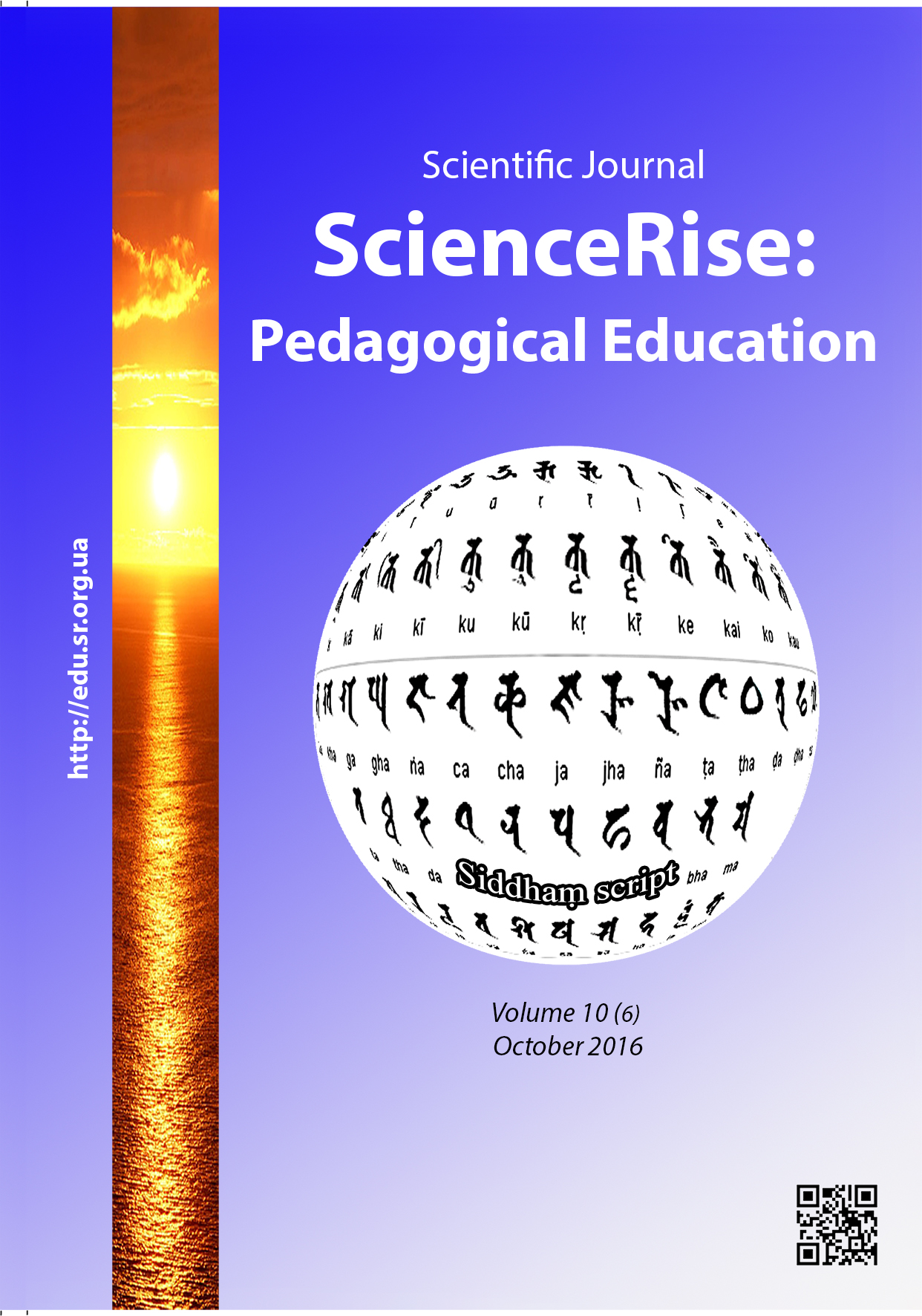The competence orientation of methodology of students-agrarians’ training in physics
DOI:
https://doi.org/10.15587/2519-4984.2016.81304Keywords:
physics, competences, competence approach, formation of competences, specialists in agro-industryAbstract
The studies demonstrated that the most graduates of higher educational institutions in Ukraine are not ready for realization of professional duties, solution of the real professional and life problems. That is why the competence approach in education is an urgent need of Ukraine for receiving specialists, able to elaborate the state and to improve its economic level.
The key agrarian’s competences include the ability to logical thinking; projective worldview, global, flexible system thinking; ability to analyze the socially significant processes, creatively solve the problems, to find non-standard solutions of typical professional tasks in agro-industrial sphere; ability to create socioeconomic projects taking into account the saving of resources, ethical and legal norms, to use the methods of system analysis in professional sphere, to elaborate the mathematical models of agro-industrial processes; to use the results of solution for prognostication of development of phenomena, processes and so on.
The subject competences, formed at studying physics, are the base of general scientific knowledge and abilities of students, necessary for the further study of general technical and special disciplines. The formation of subject competences on general physics in agrarian students of the first courses favors the formation of professional competences that include physical knowledge, abilities and skills as an important component
References
- Taranenko, I. H.; Yermakova, I. H. (Ed.) (2000). Rozvytok zhyttievoi kompetentnosti ta sotsial’noi intehratsii: dosvid Yevropejs’kykh krain [The development of vital competence and social inclusion: the experience of European countries]. Kroky do kompetentnosti ta intehratsii v suspil’stvi [Steps towards Competence and Integration into society]. Kyiv: Kontekst, 37–40.
- Raven, Dzh. (2002). Kompetentnost’ v sovremennom obshhestve: vyjavlenie, razvitie i realizacija [Competence in modern society: the identification, development and implementation]. Moscow: Kogito-centr, 396.
- Anisimov, O. S. (1996). Metodologija: funkcija, sushhnost', stanovlenie (dinamika i svjaz' vremen) [Methodology: The function of the essence, becoming (flow and connection times)]. Moscow: «LMA», 380.
- Shhedrovickij, G. P. (1964). Problemy metodologii sistemnogo issledovanija [Problems of systems research methodology]. Moscow, 48.
- Lerner, I. Ja. (1980). Process obuchenija i ego zakonomernosti [The process of learning and its laws]. Moscow, 96.
- Ovcharuk, O. V. (2003). Kompetentnosti iak kliuch do onovlennia zmistu osvity [Competencies as a Key to Educational Content Renewal]. Stratehiia reformuvannia osvity v Ukraini: Rekomendatsii z osvitn’oi polityky [Reform Strategy for Education in Ukraine: Educational Policy Recommendations]. Kyiv: K.I.S, 296.
- Nechyporenko, V. V.; Yermakov, I. H. (Ed.) (2005). Zhyttietvorchist’ osobystosti iak nova osvitnia stratehiia [The life creativity the individual as a new educational strategy]. Zhyttieva kompetentnist’ osobystosti: osobystosti: vid teorii do praktyky [Life Competence personality: personality: from theory to practice]. Zaporizhzhia: Tsentrion, 640.
- Ovcharuk, O. V.; Ovcharuk, O. V. (Ed.) (2004). Rozvytok kompetentnisnoho pidkhodu: stratehichni oriientyry mizhnarodnoi spil’noty [Development of competence approach: strategic goals of the international community]. Kompetentnisnyj pidkhid u suchasnij osviti: svitovyj dosvid ta ukrains’ki perspektyvy [Competence approach in modern education: world experience and Ukrainian prospects]. Kyiv, 111.
- Pometun, O. I.; Ovcharuk, O. V. (Ed.) (2004). Dyskusiia ukrains’kykh pedahohiv navkolo pytan’ zaprovadzhennia kompetentnisnoho pidkhodu v ukrains’kij osviti [Discussion Ukrainian teachers around the introduction of competence approach in Ukrainian education]. Kompetentnisnyj pidkhid u suchasnij osviti: svitovyj dosvid ta ukrains’ki perspektyvy [Competence approach in modern education: world experience and Ukrainian prospects]. Kyiv, 112.
- Hutorskoj, A. K. (2003). Kljuchevye kompetencii kak komponent lichnostno-orientirovannoj paradigmy obrazovanija [Key competences as a component of personality-oriented educational paradigm]. Narodnoe obrazovanie [Popular education], 2, 58–64.
- Rodyhina, I. V. (2005). Kompetentnisno oriientovanyj pidkhid do navchannia [A competency based approach to training]. Kharkov: Osnova, 96.
- Trubachova, S. Ye.; Ovcharuk, O. V. (Ed.) (2004). Umovy realizatsii kompetentnisnoho pidkhodu v navchal’nomu protsesi [Conditions of competence approach in the classroom]. Kompetentnisnyj pidkhid u suchasnij osviti: svitovyj dosvid ta ukrains’ki perspektyvy [Competence approach in modern education: world experience and Ukrainian prospects]. Kyiv, 53–56.
Downloads
Published
How to Cite
Issue
Section
License
Copyright (c) 2016 Алла Іванівна Салтикова, Світлана Миколаївна Хурсенко

This work is licensed under a Creative Commons Attribution 4.0 International License.
Our journal abides by the Creative Commons CC BY copyright rights and permissions for open access journals.
Authors, who are published in this journal, agree to the following conditions:
1. The authors reserve the right to authorship of the work and pass the first publication right of this work to the journal under the terms of a Creative Commons CC BY, which allows others to freely distribute the published research with the obligatory reference to the authors of the original work and the first publication of the work in this journal.
2. The authors have the right to conclude separate supplement agreements that relate to non-exclusive work distribution in the form in which it has been published by the journal (for example, to upload the work to the online storage of the journal or publish it as part of a monograph), provided that the reference to the first publication of the work in this journal is included.







